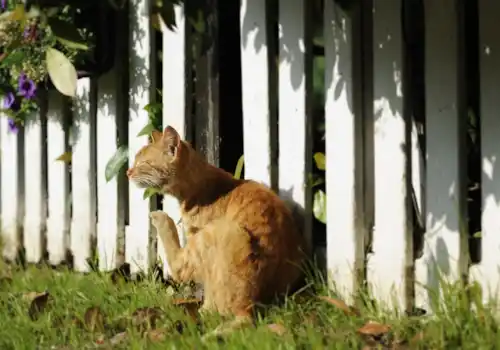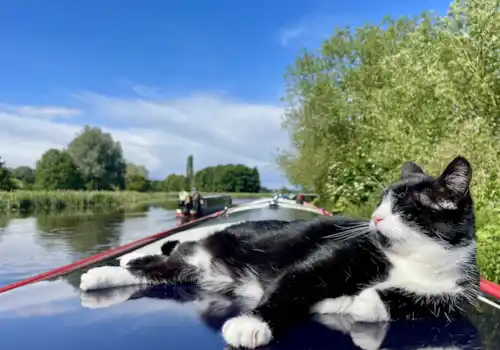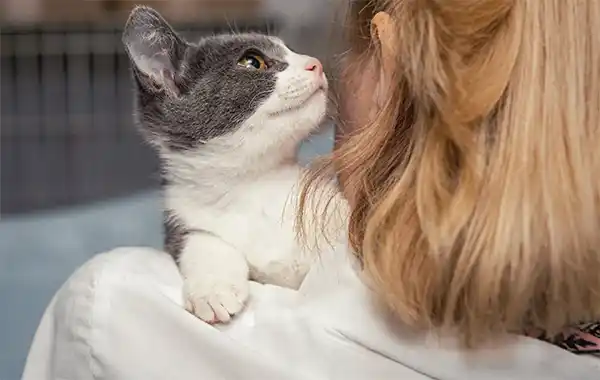Thinking about adopting a rescue cat? Our informative guide will help you find the right organisation and guide you through the rehoming process.
Taking a rescue cat into your heart and home isn’t just a responsible choice but can also be a really rewarding experience. The rehoming process can vary a little between shelters, but all should have the same goal — of making a perfect match. So, where to start?
How do I find a shelter?
You’ll spot adverts for cat rehoming charities in magazines and newspapers, or friends may be able to suggest a centre if they have a rescue cat themselves. You’ll also find details online. If you aren’t sure where to begin your search, try CatChat (www.catchat.org). This web-based rehoming charity has listings for nationwide cat rescue centres, both large and small, and for pedigree rescue and adoption.
Big national charity or smaller rescue shelter?
A larger centre may have more cats to choose from, but don’t let this be the deciding factor! If there’s a smaller one much closer to where you live, visiting will be much easier, as well as entailing a shorter and less traumatic journey when you take your chosen cat home. And, of course, less important than the size is that the shelter cares well for its residents.
What is the registration process?
Potential adopters are generally asked to register their details, either by phone, email, or in person. There’s usually a questionnaire to be filled in; the purpose is to help make the best possible match. Alternatively (or also), you may be invited to have a chat with a member of staff so you can tell them more about the sort of cat you are looking for — or to ask for more information about the one you may already have spotted online.

What should I look out for when visiting a shelter?
All of the cats should appear well looked after, with enough staff to give them the time and attention they need as well as to see to routine daily chores. A good shelter will:
- Only take in as many cats as it can care for properly.
- Provide appropriate veterinary care.
- Take steps to reduce the risk of diseases being caught.
- Provide an environment which allows the cats to relax and exhibit normal behaviours. It should go without saying that hygiene should be excellent. Those living in communal runs should not be overcrowded, should be compatible with each other, and have places where they can climb or hide when they want a little solitude.
- Assess the behaviour and temperament of each of the cats in its care to find out what they are like, and what sort of home and lifestyle will suit them best, to achieve the best possible match of cat to the new owner.
Many of the organisations involved in feline welfare are brilliant — but be prepared to walk away and look for somewhere else if you aren’t happy with what you see, or if the staff seem unable or unwilling to answer any questions you have. Taking home a cat you feel sorry for because of the conditions he’s being kept in could lead to all sorts of future difficulties, ranging from health problems to behavioural issues. As well as being expensive to sort out, these could be emotionally stressful for you.
How do I arrange to view a cat?
Many rescues have websites where you can view pictures and read brief notes about the cats in its care, and this can be a good place to start your search. You may be smitten by one of these, but remember it can be very different to meeting in person — and there may also be more cats looking for a home than are shown online. Be prepared to keep an open mind, and to maybe end up taking home a different kitty to the one who first caught your eye.

Do I need to make an appointment to view a cat?
Not all rehoming charities have permanent premises. Cats may be cared for in foster homes instead, and, in these instances, you will have to organise an appointment at a mutually agreed time. Otherwise, many shelters have a drop-in system where you can call during opening hours.
Certain times (usually weekends and afternoons) tend to be busier and, if you can avoid these, it will be easier for staff. You’ll also have less of a wait for someone to be free to have a chat with you about your ideal cat and to explain the shelter’s rehoming procedure.
However, some organisations prefer you to make an appointment to avoid overcrowding at more popular times, so make a phone call or look online to check on this and opening times before setting out.
How much does it cost to adopt a cat?
Rehoming fees vary, but expect to pay a donation of around £50 to £150. Apart from demonstrating commitment to taking on your new companion, this money helps to offset some of the bills he will have run up during his stay. Although it might sound like a lot for a non-pedigree, it actually represents pretty good value when you consider that, apart from food and accommodation costs, it covers health-checks, medical care, and often additional expenses such as microchipping.
Will the cat have up-to-date health checks before adoption?
This varies, but, as an absolute minimum, a good rehoming organisation will check cats who come into its care for any health problems and treat for fleas, worms, and any other conditions they may be suffering from, and will vaccinate them.
They may also be neutered before being passed into your care, although this isn’t always the case, and it may be a condition of rehoming that you agree to have neutering done as soon as it’s possible. In addition, cats may also be microchipped and provided with additional extras, such as an ID tag, starter pack of food, a month’s free insurance, and maybe even their own blanket and favourite toy to help them settle into their new home.
Before you leave with your new friend, check with staff as to any veterinary care that will be required, such as further vaccinations, or any ongoing treatment. Ask about the procedure should he become ill, as some charities will treat any health problems which are detected within a few weeks of adoption, free of charge.
Will I need to have a home check?
Many rehoming charities require that a home check is carried out before you can take your chosen kitty home. This has a dual purpose: firstly, to reassure the organisation that you will be able to provide the perfect forever home, and, secondly, to offer advice on settling your cat into his new surroundings, feeding, and health care, and to answer any queries you may have. Don’t panic — an immaculate home is not the most important feature, and visits are usually relaxed, chatty, informal, and arranged for a time that suits you.

What circumstances might affect your suitability to adopt a cat?
If you’re going to be moving house, or will be going away on holiday soon, it’s likely you’ll be asked you to wait until afterwards so your new cat can settle into his new surroundings with minimum disturbance. Some charities may not wish to rehome a cat if you are pregnant, while others do not feel this is a barrier to adoption and will discuss your options and give advice on the subject when you register.
If you live in rented accommodation, you’ll need to gain permission to keep a pet from your landlord or local council and to show written confirmation of this. Location may be an issue for some organisations — if you live near a very busy road, for example — although this won't be a problem if the cat is going to be kept indoors.
Centres may also ask that, at some point, all other family members who live with you come along to the centre to meet the cat you have chosen before completing the adoption process.
Will there be any back up if you hit a problem?
Centres try very hard to match new owners and cats successfully, but sometimes problems crop up. Many offer ongoing advice and support by phone and/or email following adoption, although the degree to which this is forthcoming (or at all) may vary between shelters, so is a point to inquire about when you first visit.
If you’re a first-time cat owner, it can be reassuring to know there will be experienced and knowledgeable help at hand if it’s needed; and, as problems can crop up with cats from any background, this can even be another good argument in favour of taking on a rescue kitty from a good centre.
What kind of information should I be expected to agree to?
Before you take your new pet home, he should receive a final health-check, and a member of staff will go through any additional information you may need to help him settle in. You are also likely to be asked to sign an adoption agreement/disclosure form. Read it carefully, noting any conditions you will be expected to undertake, such as neutering, if this has not already been done.
Can you take a cat home the same day you meet him?
Love at first sight does happen, and, when it strikes, you may not want to be parted for another minute! While it’s possible to go home with your new cat on the same day as your visit, this depends on how much of the rehoming process you have already finalised, such as registration and home checks, or veterinary treatment may need to be completed. But, don’t panic — you can ask to reserve the cat who has stolen your heart until all the adoption formalities have been completed.
Finally…
Many wonderful cats and kittens come from rescue and rehoming organisations. Pick your special kitty from one that is doing a great and much-needed job. But, having found and taken your cat home, continue to support its work in whatever way you are able so that other felines can fall on their paws in new homes too.
Visit the 'Rescue Cats' section of our website, and take a look at some of the cats already looking for their forever homes.








